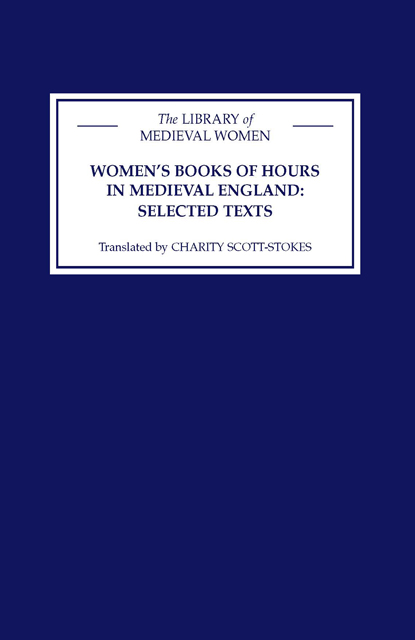Book contents
Interpretive Essay
Women and their Books of Hours
Published online by Cambridge University Press: 18 March 2023
Summary
This essay starts with observations on women's lives in England in the late Middle Ages. It goes on to consider their ownership of books of hours, their use of the books, and their possible participation in the writing of a few of the texts. Finally it returns to St Anne and the Virgin Mary.
Women's lives during the late Middle Ages were lived amidst violence and the constant threat of sudden death: from warfare, feuds, tyranny and persecution, or sickness. The hazards of childbed, infant mortality and the plague were never far away. There were wars between England and Scotland in the thirteenth and fourteenth centuries; there was the Hundred Years War between England and France from the mid-fourteenth to the mid-fifteenth century; there was civil war between the Houses of Lancaster and York in the second half of the fifteenth century. There were severe epidemics of the plague in 1349 (the Black Death) and in the early 1360s, and epidemics continued to occur. Noblemen conspired and rebelled against the king, often their kinsman, which resulted sometimes in their own deaths, and culminated four times in the death of a king, preceded in the first three instances by his deposition: Edward II was deposed and subsequently put to death in the third decade of the fourteenth century; Richard II at the very end of the century; Henry VI early in the second half of the fifteenth century; while Richard III died in battle in 1485. Richard III's short reign had begun with the death of his nephews, the princes in the Tower, in 1483.
Each usurpation or change in dynasty brought with it the imprisonment, exile or death of relatives and supporters of those who had fallen from power, and of rivals who were perceived to threaten the succession or legitimacy of the king of the moment. Women were sometimes pawns in these struggles. Occasionally they were very powerful themselves, as was true for some years of Isabel of France (1292–1358), wife of Edward II, and for many years of Margaret Beaufort (1443–1509), mother of Henry VII and grandmother of Henry VIII. It was pre-eminently true, of course, in the sixteenth century of the half-sister queens Mary Tudor and Elizabeth I, daughters of Henry VIII.
- Type
- Chapter
- Information
- Women's Books of Hours in Medieval England , pp. 149 - 161Publisher: Boydell & BrewerPrint publication year: 2006



